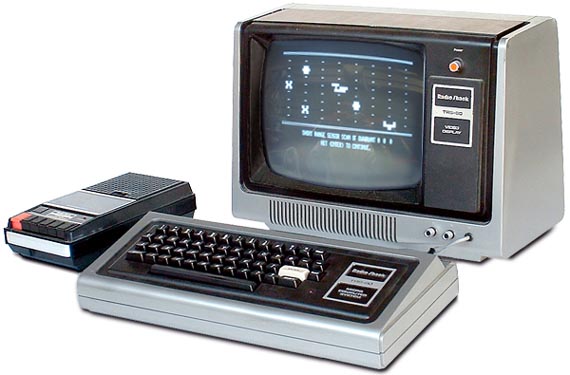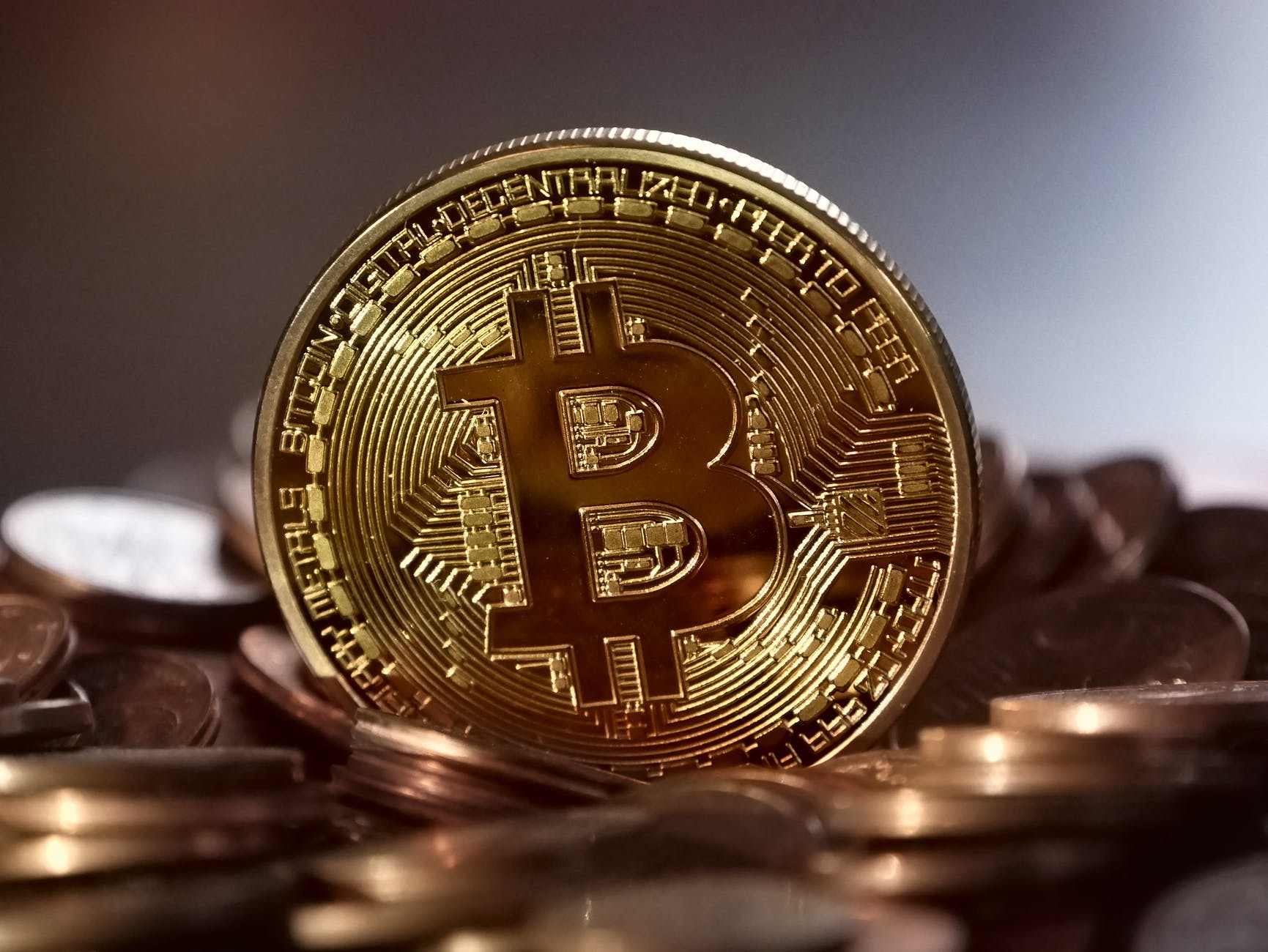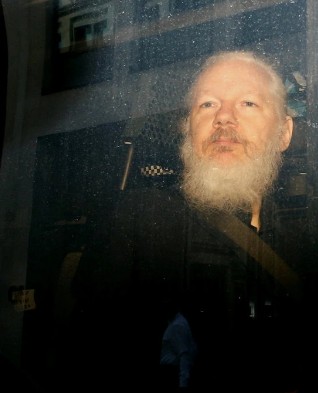Detaching from the Matrix…Small steps to big rewards
We are in a mess. We got this way because people forgot that the power brokers of the world treat life like a chess game, and we think of life like a daily or hourly experience.
Today I watched the UK police forcibly extract Julian Assange from the Ecuadorian embassy after he held out there for 7 years. Seeing a man screaming to resist seemed ironic since he predicted this very series of events would occur 7 years prior, as he feared US extradition. But what few US residents understand is what it was like growing up in the 1980s in Australia, where I and Assange are from. And the distrust of the US around the world.
I was one of the very early adopters and programmers of the first personal computers that emerged around 1977. I think my first PC I bought in 1978 - a TRS-80 Model 1 Level 2 16K computer. That computer opened up a world of creativity, problem solving, and for lack of a better term "hacking" for me. Although I was in the first wave to get into computing back in those years, not long after me came many, many others. Often starting off on different computers, including the Commodore 64 computer, but there was a kinship that we all had in Australia. I mean we were on the other side of the planet, there was no Internet back then, and yet we had to work all this stuff out on our own. You form a community quickly in that situation.

In Australia there are about 9 major cities in the country. The entire population back in the 1980s was about 17 million - about the size of the population of Los Angeles county today. But it spanned a land mass the size of the United States. With such a small population you found it hard to meet new people, and when it came to a niche and emerging community around computers, there weren't many of us. I mean we had to work as a team because that was the only way that we could share our discoveries in any meaningful way, but it didn't take long until you knew everyone in the computer community in your home town.
So each town would reach out to others to grow. I lived in Adelaide, and the closest next city to us was Melbourne. Julian Assange was an active member of the computer club community in Melbourne in the mid 1980s, although I didn't ever meet him directly.
Now I'm a little older than he was, and when he started getting into computers, the first modems started to come online. You could dial up to BBS's (Bulletin Board Systems) which were the first level of collaboration online that preceeded the Internet. I know Assange was big into dialup systems. My understanding is that he was using a C64 computer back then. There were not too many BBS's in Adelaide, and long distance phone calls back then was extremely expensive, so I skipped most of that world until I moved to the USA in 1989. But Assange didn't and was active in the dial up BBS systems back then, eventually being arrested for computer hacking in his early years.
The 1980s were formation years for all of us in the computer club world. For some, they chose the darker side of hacking, etc. and for others we stayed pretty legit. I had started a business then, so I was more interested in growing a legitimate business than being a computer punk and breaking things. But I did have respect for those that seemed to know all the tricks and were very creative in ways to access computer resources. Assange was one of that crowd.
The 1980s was the era of Ronald Reagan. But it was also the era of Oliver North, movies by Oliver Stone, punk rock, synth rock and big hair. In Australia there was a local band that became quite a legend locally, and eventually exported their music to the USA in the 1990s, called "Midnight Oil". I bring them up because they had this one big hit song in Australia that didn't really get out of the country called "US Forces". I found a live performance of it from a live concert in Sydney. You can see the Sydney Harbor Bridge in the background as a ship from Panama cruises on by as the song starts.
Remember this is the music that Assange and everyone else in their 20s listened to. This was the general message that was being sent to all of the youth in Australia. It is a pretty decent song, so it makes sense that it would be popular with the kids back then.
The lyrics are really simple:
"US Forces give the nod, it's a setback for your country
Bombs and trenches all in rows, bombs and threats still ask for more
Divided world the CIA, who controls the issue
You leave us with no time to talk, you can write your assessment
Sing me songs of no denying, seems to me too many trying
Waiting for the next big thing
Will you know it when you see it, high risk children dogs of war
Now market movements call the shots, business deals in parking lots
Waiting for the meat of tomorrow
Sing me songs
Everyone is too stoned to start emission
People too scared to go to prison
We're unable to make decision
Political party line don't cross that floor
Lt. Ron Hubbard can't save your life
Superboy takes a plutonium wife
In the shadow of Ban The Bomb we live
Sing me songs..."
The attitude back then was that the USA was meddling in the affairs of too many countries, infiltrating their governments, manipulating their political systems, etc. and generally the sovereignty of the nation was at risk. The passion of the song as played demonstrates just how strongly held that belief was.
So we fast forward from the days when songs like this were shared around on cassette tapes, to the world of Spotify. Those of us raised in computer clubs in the 1980s may have had careers in IT. We made good money with our skills, and as had happened to me, I was able to travel the world working for large corporations and even being on the early team to create a corporation. International globetrotting became the next thing we mastered as airplane travel became more affordable. I ended up living & working in California. Assange ended up all over the place - from Australia to Europe to the UK, etc.
But remember we all had the songs of our 1980s playing in our subconcious. The irony was that Midnight Oil became a Billboard #1 hit band in the early 1990s in the USA with their "Blue Sky Mining" album. If you remember back to then, you might know some of those songs. The USA knew Australians as "Crocodile Dundee" and the band "Men at Work", with the "I come from a land down under" song. We were cute, unusual animals the our American friends. It worked for me as my life became Americanized. I was a welcomed immigrant, so I just ran with that and all was great.
For those like Assange, however, they were raised with the distrust in the US system and his antics since around 2010 are legendary. Using the techniques that he honed in the 1980s & 90s and beyond, he mastered the art of cryptography, embracing the "Cypherpunk" community and created Wikileaks. His technology held up, despite state actors attacking it, the financial industry trying to shut him down, etc. The irony of all of this was that it was because of Wikileaks that I got into Cryptocurrency and made a killing on Bitcoin.
I owe a great thank you to Assange. Around 2011, while he was exposing state secrets from different countries (incl. the USA), he managed to get all the funding to keep his servers running pulled by having Mastercard, VISA, Amex, PayPal, Western Union and most US banks shut him down. When this happened I was furious. But he responded by explaining that anyone that wanted to donate to his cause could do so using this new thing called "Bitcoin". I was interested. I had run across Bitcoin before, through the MMORPG community and I had a subcontractor working for me that wanted to be paid in it. So I bought some. I think I got it through the Mt. Gox exchange back then. It was really cheap. I think I paid about $7 a BTC back then. I did send some to Wikileaks as a donation. I have a T-shirt from them reminding me of that transaction.
But I also kept a lot of it. I did that because Mt. Gox was in Japan and you had to physically wire money (which cost about $50 to do at the time) to them, and since $50 wire fee, I was not going to do this for less than about 100 BTC. So I did that. I donated some, I used some, and I kept the majority. I had no idea what would come of this.

I continued to aquire more BTC as I could get it from local exchanges and I expanded my use of it with my subcontractors. The price went crazy in 2017, and by then I was just HODLing it (holding it) and when I saw the price go up to almost $20K a BTC, I realized this was my golden ticket. As the pricing started to come down, I started to sell and before it went too low I had sold my holdings and made a killing on this.
All because one of the guys in the computer clubs that I grew up with in the 1980s shared something with all of us, but I was awake at the time to realize it.
I'm not going to get into a political discussion about all of this, only to say consider where he came from, the attitude that countries outside of the USA have towards US foreign policy and the risk to their own sovereignty. And the level of angst that exists out there because of all of this. Is it not understandable that an Assange will emerge? Is it not also a warning sign that other Assanges will follow in his footsteps?
Seven years of isolation in an embassy has to turn any sane person into a maniac. I saw this with my own eyes with Assange and since about 2016 or so, his actions seemed irrational and manipulated. He wasn't the same Julian Assange that I admired in 2011. Or the one that put me onto Bitcoin then. He changed a lot.
But when I saw them dragging him off into a police van, all those memories came flooding back. I emailed a buddy of mine in Australia who also grew up about the same time, and was interested to read that he felt the same "pissed off" feelings towards what had transpired with Assange. I know a lot of people on Twitter seem to feel the same way - it was almost like a revival of the 2011 positive support that Wikileaks was getting back then.

If anything happens as a result of his arrest, I believe it will be a revitalization of the distrust in the USA by foreign countries and by many inside the USA who know that crimes against humanity and the constraining of US citizens is not ok. Whether this is being done by the "deep state", or the political parties, or banksters or corporations, it is not OK. We all deserve to have the same freedoms as granted to us by the US constitutions, but we must learn to be humble and embrace other cultures - showing them the respect we expect to get back, and respecting their own soverignty if we have any chance of being seem as good world citizens.
The ability for all of us to roam unconstrained and welcomed into other countries comes down to how we treat those other countries, and Assange exposed the worst treatment that nations have done to their own citizenry but also other foreign nations. Exposing those truths, whether they are what you want or do not want to hear, is a role that traditional journalism has failed at and as a result I still support Wikileaks to this day.
The lead singer of Midnight Oil, Peter Garrett, ran and successfully was elected to Australian politics for a number of years. Although he is no longer active in politics, it is ironic how someone with such anti-establishment music became embraced by the voters and elected to the very establishment he often faught against.